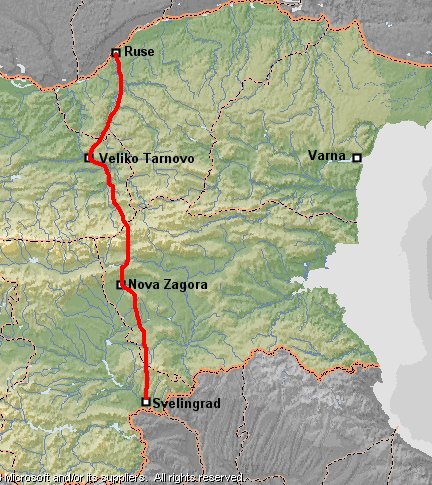 We
were in Bulgaria from the 6th to the 18th March 2003. We entered at Svelingrad
(Svilengrad) in south-eastern Bulgaria and went pretty much due north to Ruse on the Danube.
We
were in Bulgaria from the 6th to the 18th March 2003. We entered at Svelingrad
(Svilengrad) in south-eastern Bulgaria and went pretty much due north to Ruse on the Danube. We
were in Bulgaria from the 6th to the 18th March 2003. We entered at Svelingrad
(Svilengrad) in south-eastern Bulgaria and went pretty much due north to Ruse on the Danube.
We
were in Bulgaria from the 6th to the 18th March 2003. We entered at Svelingrad
(Svilengrad) in south-eastern Bulgaria and went pretty much due north to Ruse on the Danube.
We liked Bulgaria, it was very cheap (one third the price of the UK for food, restaurants and hotels), the roads were quiet and the people were reasonably friendly. However it is a more dangerous country than anywhere in the EU, the people are very poor and the economic situation is bad. As a result the roads are potholed, signposting is not of a high standard and village shops are poorly stocked (but you will not go hungry). We never felt threatened but we were certainly very conspicuous and we were careful to camp well out of sight.
Small towns always have vegetable shops and general grocery shops selling tins. The villages often just have a cafe that doubles as a shop and will have things like tins of fish, pasta, onions if you are lucky, but no other vegetables. However a Bulgarian contact tells us that:
"The shops in the villages in Bulgaria don't offer vegetables, because in the Bulgarian villages everyone grows vegetables in his garden, so no one would buy them from the shop. In case like yours you just have to knock on the first house you see and ask for kilo of tomatoes ("domati" in Bulgarian, about 1 euro per kilo is quite enough) or whatever else you wish and the villagers will be happy to sell it to you, it is a common practice, don't hesitate."
The road network is good and there is a lot of beautiful scenery. Horse and donkey carts are still widely used which is very picturesque and means that drivers are used to slow moving vehicles. Villages seemed to be compact and widely separated, perhaps a relic of communist collective farms, which meant it was easy to find places to camp wild (although this is illegal and you need to rehearse your excuses for when you don't have enough registration papers when you leave the coutry). We were kept awake some nights by wolves howling. The sound is utterly spine chilling and when close to makes it impossible to sleep. We have been assured they will not attack humans, but it would be prudent not to have meat in the tent because they could come looking for it.
We had sunny, cold weather for our first week and then it clouded up and we had several days with light snow. Judging by the snow banks besides the higher roads, these would have been impassible a few weeks before, so I would say that mid-March is the earliest it would be sensible to go cycle touring.
The language is similar to Russian, and uses the cyrillic alphabet. Very few signs are in English and very little English is spoken in the countryside. It is essential to be able to pronounce the cyrillic names for places so learning the alphabet beforehand would be a good idea. Some people speak German.
We didn't see any bike shops but bicycles are widely used and we even saw racing cyclists training on quite nice looking machines so they must exist.
Our guidebook barely mentioned Svelingrad so I thought the following could be of use to other cycle tourists crossing the border from Greece or Turkey.
Svelingrad itself has a three star hotel which we did not visit. 2km from Svelingrad, in the direction of the Greek border is a hamlet by Svelingrad railway station. Coming from Greece, the tall white building at the T junction between the Greek border road and the Sofia road is a hotel (there is a sign saying so), which charges just 12Lv per person, and there is also another hotel charging 10Lv per person near the railway station. This second hotel is also a cafe-bar but there is no sign advertising the fact that it is a hotel. There is a restaurant and an internet cafe a few doors down from the hotel. (2Lv = 1 euro).